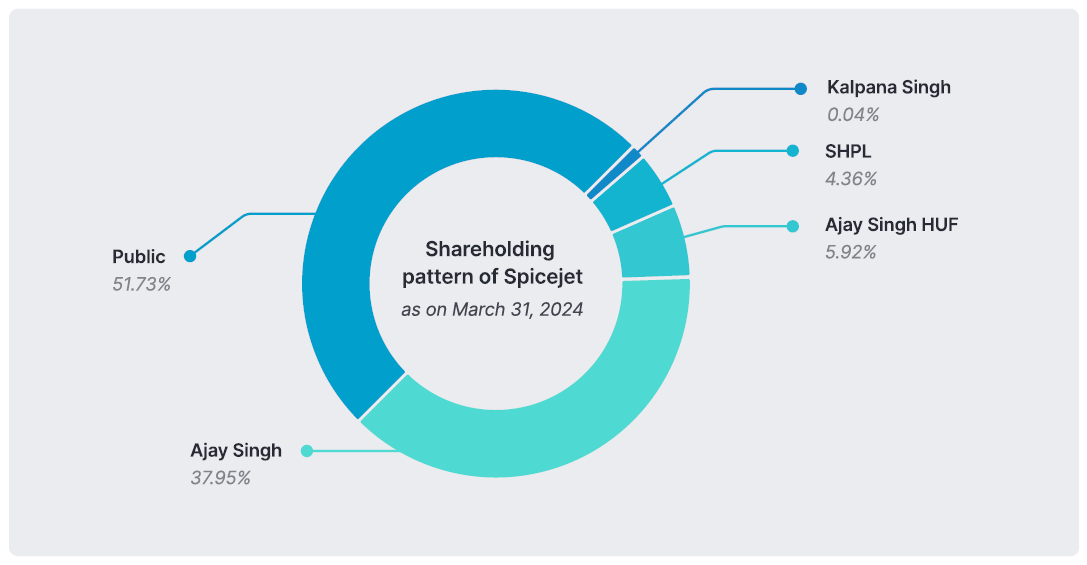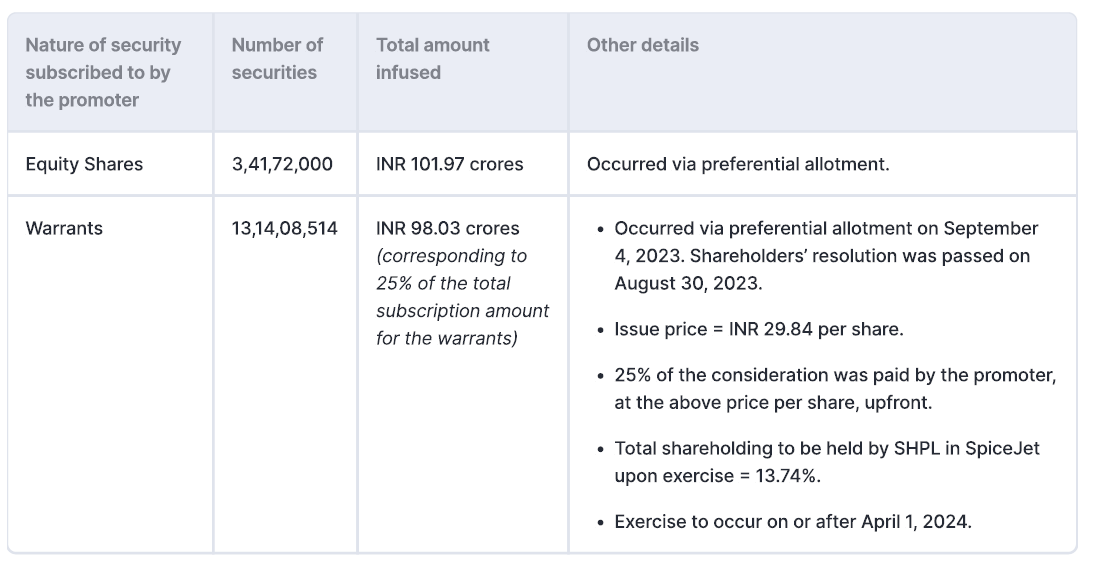Deal Talk
September 30, 2024
SEBI “Clears the Runway” For Spicejet: Promoters to Take Off Without Open Offer Turbulence
A. Introduction
Takeover of public
listed companies in India is governed under
the SEBI (Substantial Acquisition of Shares
and Takeover) Regulations, 2011 (‘Takeover
Code’). The Takeover Code provides
for the following triggers for an open offer
obligation on the acquirers and persons acting
in concert with such acquirers (‘PAC’):

Regulation 10 of the
Takeover Code provides for general exemptions
available to an acquirer and a PAC. While Regulation
10 provides specific types of events and / or
acquisitions which will be exempt from the requirement
of making an open offer, Regulation 11 also
provides the Indian securities market regulator
(i.e. the Securities and Exchange Board of India
(‘SEBI’)), the
power to exempt any transaction from an open
offer obligation, if SEBI believes that such
exemption is required in the interests of investors
in securities and the securities market. An acquirer and a PAC
can file an exemption with SEBI by providing
their rationale for seeking such exemptions.
Over the years, there have been a lot of precedents
for deal-making through the grant of such exemptions.
Recently, SEBI granted an exemption to the promoters
of SpiceJet Limited (‘SpiceJet’)
for conversion of their warrants into equity
shares of SpiceJet. This exemption is unique
given that the promoters of SpiceJet made a
strong case to SEBI that the open offer obligation
was onerous on the promoters and would be further
detrimental to the financial position of SpiceJet.
To prove their commitment to this position,
the promoters also agreed to discharge certain
additional obligations in case the exemption
were to be granted. In this Deal Talk,
we discuss this exemption from SEBI, and discuss
how a voluntary attempt to comply with spirit
of the law may be beneficial in structuring
deals and assisting with a regulatory approval
process (which, in this case, involved seeking
an exemption from SEBI with respect to the mandatory
open offer requirements under the Takeover Code).
B. Particulars of exemption sought
by the promoters of SpiceJet

In light of the 2019
Covid pandemic, the Indian government had announced
an Emergency Credit Line Guarantee Scheme (‘ECLGS’)
to provide financial support to Indian companies
in different sectors, which also included aviation.
Under the ECLGS, an airline was eligible for
a loan of up to INR 1,500 crores per borrower
(as part of which, up to INR 500 crores was
allowed only if there was proportionate equity
contribution by the promoters / owners of the
Company). As part of the ECLGS,
existing lenders of SpiceJet had previously
sanctioned credit facilities worth INR 200 crores,
and the promoters of SpiceJet were required
to also infuse proportionate equity capital
to avail disbursement of the credit facilities. In order to satisfy
the aforementioned criteria and to help SpiceJet
during its financial distress, SpiceJet Healthcare
Private Limited (‘SHPL’)
(a ‘promoter group entity’ as per
applicable SEBI regulations) infused INR 200
crores in SpiceJet as part equity and part warrant
transaction structured as below:

As per the SEBI (Issue
of Capital and Disclosure Requirements) Regulations,
in case of issuance of warrants by a listed
company, at least 25% of the consideration amount
based on the exercise price shall be paid upfront
and the remaining unpaid consideration shall
be paid at the time of exercise of the warrants.
Therefore, SHPL was statutorily obligated to
pay INR 294.09 crores to SpiceJet at the time
of exercise (which corresponds to balance 75%
of the consideration amount for warrants). The other promoters
of SpiceJet would be considered as ‘persons
acting in concert’ with SHPL (as Mr. Ajay
Singh holds 50% shares of SHPL), and the total
shareholding of SHPL with its PAC would be more
than 25%. Therefore, SHPL and the other promoters
of SpiceJet could only acquire 5% additional
shares of SpiceJet in any financial year to
avoid triggering an open offer due to the occurrence
of a creeping acquisition (i.e. an acquisition
of up to 5% shareholding that is permissible
for a person holding 25% shareholding of a public
listed company, with any increases beyond this
threshold being subject to a mandatory open
offer under the Takeover Code). Given that the
warrants upon exercise would entitle SHPL to
13.74%, the exercise of the warrants would trigger
a creeping acquisition. SHPL requested SEBI
for an exemption from the obligation to undertake
an open offer. The grounds provided by SHPL
for this exemption request were as follows:



C. SEBI’s position with
respect to the exemption
D. Does this mean that others
can also claim a similar exemption from the
open offer requirement under the Takeover Code?
While previous exemptions
granted by SEBI under the Takeover Code have
precedential value, not all grounds raised by
SHPL were something which provided comfort to
SEBI. The open offer being a paper exercise
due to no actual change in control or being
an additional cost to the acquirer would, in
all probabilities, not be considered as valid
grounds for seeking an exemption from the open
offer requirement. The factors that would
have perhaps given most comfort to SEBI (which
is also reflected in observations by SEBI) were:
(a) the fact that SHPL had invested into SpiceJet
to ensure eligibility under the ECLGS in order
to assist the company during financial distress;
(b) the self-imposition of an additional lock-in
(over and above the period contemplated within
the law); and (c) restriction of the exercise
of voting rights to 5% in every financial year
(in order to ensure compliance with applicable
law). This helped SHPL convince SEBI that their
intention was always to help SpiceJet, and therefore
this exemption would be in the interests of
investors in securities and the securities market. While it would be interesting
to see if SEBI continues to provide similar
exemptions based on self-imposition of restrictions,
solely self-imposition would not ideally entitle
an acquirer for an exemption. A key factor in
this case was the financial distress being faced
by SpiceJet. There have been multiple precedents
of SEBI providing exemption from open offer
to the investors in cases where the target company
is going through financial distress and resolving
the financial distress specifically required
promoter fund infusion as per the ECLGS scheme.
Neither of these reasons in silo would have
helped the promoters of SpiceJet. For instance,
in the exemption order for acquisition of Lyka
Labs Limited (2016), the promoters claimed that
the target company was in financial distress
and their subscription to the warrants was for
resolving the financial distress and therefore,
they were seeking an exemption from open offer
upon conversion of such warrants. One of the
key reasons why SEBI denied the exemption was
that while the company was in financial distress,
the banks did not stipulate that promoter infusion
was a condition precedent to the banks providing
further funds. The banks in their letter had
only communicated that the company is facing
a liquidity crunch, and it was advisable that
the company should infuse fresh capital or increase
their net worth to improve their financial ratio.
SEBI was of the view that this was in no nature
a stipulation and therefore did not grant an
exemption. So, the fact that as part of ECLGS,
promoter infusion was a stipulation was also
a key consideration for SEBI. Additionally,
in the same order (and other precedents as well)
SEBI has held that additional cost to the promoter
or financial status of the promoter is not a
reason for exemption from open offer.
Authors:
Anurag Shah,
Parina Muchhala and
Nishchal Joshipura
You can
direct your queries or comments to the relevant member.
Disclaimer
The contents of this hotline should
not be construed as legal opinion. View detailed disclaimer.
This hotline does not constitute a
legal opinion and may contain information generated
using various artificial intelligence (AI) tools or
assistants, including but not limited to our in-house
tool,
NaiDA. We strive to ensure the highest quality and
accuracy of our content and services. Nishith Desai
Associates is committed to the responsible use of AI
tools, maintaining client confidentiality, and adhering
to strict data protection policies to safeguard your
information.
This hotline provides general information
existing at the time of preparation. The Hotline is
intended as a news update and Nishith Desai Associates
neither assumes nor accepts any responsibility for any
loss arising to any person acting or refraining from
acting as a result of any material contained in this
Hotline. It is recommended that professional advice
be taken based on the specific facts and circumstances.
This hotline does not substitute the need to refer to
the original pronouncements.
This is not a spam email. You have
received this email because you have either requested
for it or someone must have suggested your name. Since
India has no anti-spamming law, we refer to the US directive,
which states that a email cannot be considered spam
if it contains the sender's contact information, which
this email does. In case this email doesn't concern
you, please
unsubscribe from mailing list.
 |
|
We aspire
to build the next generation
of socially-conscious lawyers
who strive to make the world
a better place.
At NDA, there
is always room for the right
people! A platform for self-driven
intrapreneurs solving complex
problems through research, academics,
thought leadership and innovation,
we are a community of non-hierarchical,
non-siloed professionals doing
extraordinary work for the world’s
best clients.
We welcome
the industry’s best talent -
inspired, competent, proactive
and research minded- with credentials
in Corporate Law (in particular
M&A/PE Fund Formation),
International Tax , TMT and
cross-border dispute resolution.
Write to
happiness@nishithdesai.com
To learn more
about us
Click here.
|
|
Chambers
and Partners Asia
Pacific 2024:
Top Tier for Tax,
TMT, Employment,
Life Sciences, Dispute
Resolution, FinTech
Legal
Legal 500
Asia Pacific 2024:
Top Tier for Tax,
TMT, Labour &
Employment, Life
Sciences & Healthcare,
Dispute Resolution
Benchmark
Litigation Asia
Pacific 2024:
Top Tier for Tax,
Labour & Employment,
International Arbitration
AsiaLaw
Asia-Pacific 2024:
Top Tier for Tax,
TMT, Investment
Funds, Private Equity,
Labour and Employment,
Dispute Resolution,
Regulatory, Pharma
IFLR1000
2024: Top
Tier for M&A
and Private Equity
FT Innovative
Lawyers Asia Pacific
2019 Awards:
NDA ranked 2nd in
the Most Innovative
Law Firm category
(Asia-Pacific Headquartered)
RSG-Financial
Times:
India’s Most
Innovative Law Firm
2019, 2017, 2016,
2015, 2014
|
|
|
|

